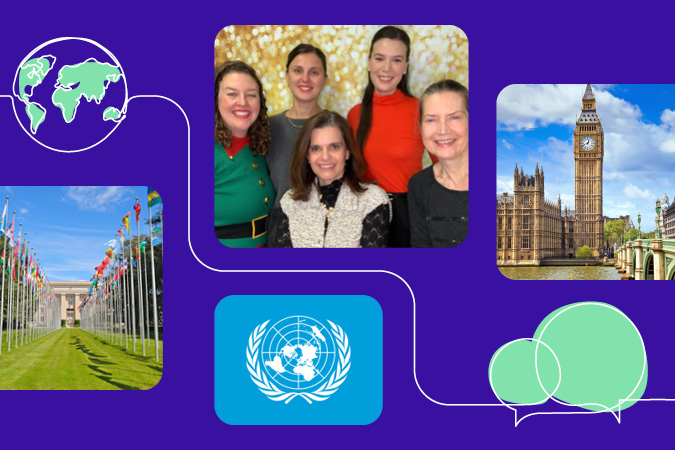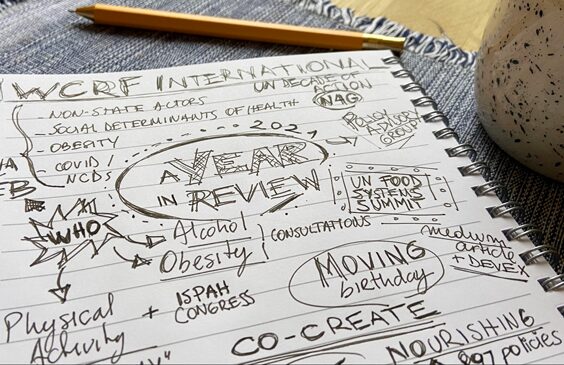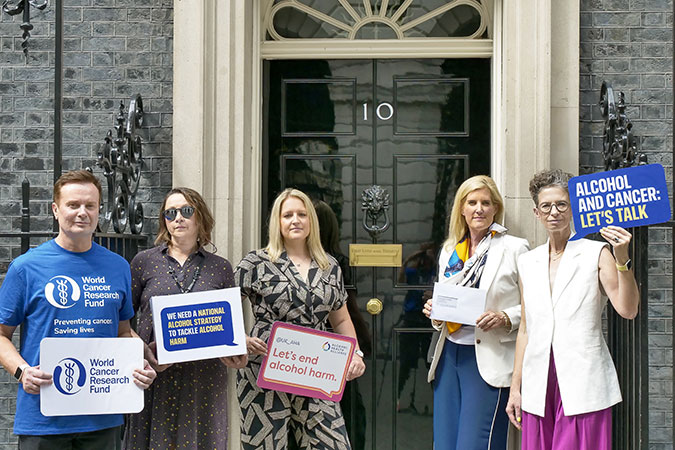We commend the UK Government for setting out an ambitious 10-year strategy with a strong focus on survival, innovation, and patient experience.
Yet the Plan misses a chance to put prevention front and centre, with stronger alcohol policy, breastfeeding protection, and a dedicated focus on the modifiable risk factors that drive cancer
A bold ambition on survival and care
We particularly welcome the Government’s bold target that 75% of people diagnosed with cancer from 2035 will be cancer-free or living well five years after diagnosis – a genuine step change in ambition. The Plan’s emphasis on earlier diagnosis, reducing emergency presentations, expanding evidence-based screening, and improving access to innovative treatments has the potential to deliver meaningful improvements for patients across England.
We also welcome commitments to improve patient experience and outcomes, including personalised care, better coordination, and stronger accountability for delivery through a reformed National Cancer Board.
Progress on prevention – but a missed opportunity to go further
We welcome the Plan’s commitments on cancer prevention, including action to crack down on the illegal use of sunbeds and harmful UV exposure, progress towards a smoke-free generation, and expanded access to HPV vaccination as part of the ambition to eliminate cervical cancer. These are important, evidence-based interventions that will prevent cancers and reduce future pressure on the health system.
However, prevention deserves greater prominence. New global evidence shows that up to four in ten cancers worldwide are linked to preventable causes. Tackling the lifestyle and environmental factors that increase cancer risk is one of the most effective and affordable ways to prevent cancer in the long term.
Crucially, modifiable risk factors are not evenly distributed. Tobacco use, harmful alcohol consumption, unhealthy diets and obesity disproportionately affect people in lower socio-economic groups, driving stark and persistent inequalities in cancer incidence, survival and mortality. Strong, population-level prevention policies are therefore essential not only to reduce cancer overall, but to narrow health inequalities and ensure the benefits of progress are shared fairly.
We believe the Plan would have benefitted from a dedicated chapter on prevention, helping to drive a necessary mindset shift and embed the principle that diet, alcohol, and breastfeeding policies are cancer policies.
Action on alcohol and breastfeeding is lacking
The Plan does not expansively build on the wider prevention measures announced in the Government’s 10 Year Health Plan, particularly in relation to alcohol policy. Alcohol remains a leading avoidable cause of cancer, yet the Plan does not commit to minimum unit pricing (MUP) or restrictions on alcohol advertising and marketing, including where it reaches children and young people – among the most effective and evidence-based tools for reducing population-level alcohol harm and cancer risk.
We also note the absence of strengthened action to protect breastfeeding, including full compliance with the International Code of Marketing of Breast-milk Substitutes. Breastfeeding reduces cancer risk for mothers and improves long-term health outcomes for children, and stronger implementation of the Code should form part of a comprehensive, life-course approach to cancer prevention.
Partnerships with food manufacturers must also be approached with caution, given past experience of policy dilution. Where voluntary approaches fall short, Government must not shy away from mandatory measures. Strong governance, transparency, and protection from undue commercial influence are essential to ensure prevention policies deliver for public health.
Biomedical innovation matters but it is not enough
We are pleased to see the Plan’s commitment to biomedical prevention, including continued rollout of the HPV vaccine, trials of preventative vaccines such as LungVax, and plans to accelerate uptake of GLP-1 medicines for those who clinically need them. These innovations are hugely important and represent real progress in reducing cancer risk and improving outcomes.
But vaccines and medicines alone are not sufficient. We must also tackle the environments that make us sick. We cannot continue to treat people only to send them back to the same food, alcohol, and physical environments that drove ill health in the first place. Population-level prevention policies remain essential to reducing cancer incidence at scale.
Crucially, prevention is not only about avoiding diagnosis. It also supports survival and quality of life, contributing directly to living well with and beyond cancer. Good nutrition, physical activity, and maintaining a healthy weight are fundamental to recovery, rehabilitation, and long-term wellbeing. Prevention and survivorship are not competing priorities – they are mutually reinforcing.
Digital innovation as a driver of prevention
We welcome the ambition to harness digital innovation through the NHS App. By 2028, the App will allow patients to manage screening invitations, appointments, treatment plans, and prehabilitation, with personalised prevention advice drawing on genomic, lifestyle, and wearable data.
This creates a major opportunity to establish the NHS App as a trusted, accessible source of cancer prevention information, supporting people to understand and act on behaviours that can influence cancer risk over their lifetime. We would welcome the opportunity to contribute evidence-based, tried and tested prevention resources, developed and evaluated for public audiences, to support this ambition and ensure alignment with the best available science.
Prehabilitation, rehabilitation and supportive oncology
We strongly welcome the Plan’s focus on prehabilitation, rehabilitation, and supportive oncology, including dietary and physical activity advice, psychological support, and acute oncology for those with more complex needs. The evidence is clear: these interventions improve treatment tolerance, recovery, and long-term outcomes. We believe the ambition should be for these services to be available to all patients, where appropriate, as standard.
Research and the cancer workforce
Research and the cancer workforce will be central to delivering the Plan’s ambitions. While we acknowledge the focus on accelerating clinical research and innovation, there is a clear opportunity to strengthen investment in cancer prevention research, including implementation research on modifiable risk factors. Healthcare professionals must also be supported with the time, training, and tools to deliver prevention, behaviour change, and survivorship support alongside treatment.
Children and young people
We welcome the Plan’s commitment to improving nutrition for children and young people undergoing cancer treatment in acute settings. Good nutrition is fundamental to treatment tolerance, recovery, and survival. We hope this approach will be extended to all patients, and that public procurement across health settings consistently meets the highest nutritional and sustainability standards through the upcoming NHS food standards review.
Matching survival ambition with prevention action
We welcome the ambition and scope of the National Cancer Plan. The integration of prehabilitation, rehabilitation, supportive oncology, digital innovation, and prevention advice into the cancer pathway is a significant step forward.
However, there remains a missed opportunity to embed prevention at the heart of the Plan, through stronger alcohol policy, breastfeeding protection, and a dedicated focus on the modifiable risk factors that drive cancer incidence.
A Plan that matches its ambition on survival with bold, population-level prevention action will reduce cancer incidence, improve outcomes, and deliver a financially sustainable cancer strategy for generations to come.
We stand ready to work with Government, healthcare professionals, and partners to help make this ambition a reality.
It has long been established that junk food advertising drives consumption of unhealthy food and drink, shaping preferences from a young age and contributing to overweight and obesity.
The strength of the evidence base is perhaps best corroborated by the enormous advertising budgets of unhealthy food and drink companies. If advertising didn’t pay off, why would Coca-Cola allocate a whopping $5 billion to their worldwide advertising budget in 2024?
Restricting junk food advertising is therefore a powerful and proven public health measure. Yet, most recently, you may have seen measured responses from public health advocates in the UK, including World Cancer Research Fund, upon the introduction of long-awaited junk food advertising restrictions in January 2026.
Marketing regulations can underdeliver
The bottom line is that whilst the UK’s restrictions mark a step forward in protecting children’s health at a time when obesity rates continue to rise, they have been weakened and delayed by industry influence – most notably through the introduction of a sweeping brand exemption. This significantly undermines the policy in two key ways. First, it allows brands that are synonymous with foods high in fat, salt and sugar (HFSS) to continue being advertised – think the famous Golden Arches. Second, the lack of brand restrictions enables companies to promote entire HFSS product ranges, just not individual products. Ultimately this preserves brand visibility and influence while circumventing the spirit of the regulations.
The brand exemption is not the only weakness of the advertising restrictions. Work on this policy began as far back as 2018, and in the years since, the marketing landscape has evolved dramatically. Simply put, the regulations are not a match for the rapidly changing marketing landscape. For example, direct marketing channels, such as email and text messaging, remain unchecked, allowing unhealthy food and drink companies to continue targeting consumers.
The unseen cost of delays and dilution
The unfortunate tale of industry influence is not unique to the UK. Globally, efforts to curb the scourge of junk food on society are denied, diluted, derailed and delayed by industry.
Marketing restrictions are difficult to get over the line. In the UK, the policy was subject to five separate consultations and four delays to its rollout. That is an immense amount of government time, effort and resources. Moreover, the burden it places on the public health sector, which often operate under capacity constraints, must be acknowledged.
We also need to recognise that obesity, a key risk factor for cancer, is linked to deprivation. In many countries, those living in the most deprived areas are more likely to be living with obesity compared to those in the most affluent communities. Delays or failures to implement effective policies therefore disproportionately impact those who are already most vulnerable.
Industry opposition at full throttle
The resistance we see to advertising restrictions can partly be explained by the fact that marketing is not a peripheral commercial function. Instead, it sits at the very core of food and drink businesses, playing a pivotal role in building brand value, customer loyalty and long-term profitability.
Marketing restrictions are also unusually visible. Unlike reformulation targets or nutrient thresholds, which operate largely behind the scenes, advertising bans are immediately noticeable. They can also be drawn into wider debates around personal responsibility, censorship and creativity – making the more contested and politically charged. They tend to hit a nerve.
Recognition of these issues is not a justification for inaction. The reality is that companies by their very nature are required to innovate, and they can do so in a way that supports public health rather than undermining it.
Action must go beyond the status quo
Let’s be clear, no one is suggesting that junk food marketing restrictions alone will solve the obesity crisis. However, the version we’ve seen introduced in the UK will most certainly underdeliver, especially given the restrictions don’t sit within a broader framework of measures designed to improve the nation’s diet yet. Countries in Latin America, including Chile and Mexico, have taken more holistic approaches which embed marketing restrictions within a wider set of measures including mandatory warning labels and robust school food standards
But when governments introduce policies that appear ambitious on paper but lack the strength to deliver in practice, they risk entrenching the status quo while giving the impression of action. This pattern is not unique to food. Similar delays and dilutions are seen across alcohol, gambling and other health-harming industries, where commercial interests routinely take priority over public health.
Ultimately, the question is not what needs to be done, but what governments are willing to do to protect public health.
Today the UK Government published a long-awaited update to the Nutrient Profile Model (NPM) – a quiet but powerful public health tool that is central to cancer prevention and tackling diet-related diseases.
NPMs are used to assess how healthy foods are, classifying products as healthier or less healthy (often referred to as HFSS – high in fat, salt and sugar). While no system is perfect, the NPM is critical because it underpins food policy, determining which products are captured by regulation and which are allowed to escape it.
The UK’s existing junk food advertising and promotion restrictions are still based on the 2004 NPM. This means the effectiveness of these policies depends entirely on a model developed more than 20 years ago.
A robust, evidence-based NPM is essential to prevent unhealthy products continuing to fall through regulatory gaps. Since the original model was developed, the science on diet and health has moved on.
Obesity firmly established as major driver of cancer
In particular, evidence linking unhealthy diets, overweight and obesity, and cancer risk has grown substantially. Obesity is now firmly established as a major driver of cancer and one of the leading preventable causes of the disease in the UK and globally. If food policy is to meaningfully improve diets and reduce obesity-related cancer risk, it must be built on a credible, up-to-date NPM.
Importantly, the updated NPM will better reflect recommendations from the independent Scientific Advisory Committee on Nutrition (SACN) on free sugars and fibre, ensuring policy aligns with current scientific guidance.
We therefore warmly welcome today’s publication of the revised NPM, first consulted on in 2018. This is an important step forward. However, the updated NPM is not yet applied in policy.
The Government has committed to holding a public consultation in 2026 on applying the 2018 NPM to advertising and promotion restrictions. We stand ready to work with the UK Government at this next stage to ensure the NPM delivers real progress for cancer prevention and overall public health.
After years of delays, a law to ban ads for unhealthy food and drink before 9pm on TV and across online platforms, will start.
Commenting on the ban, Dr Giota Mitrou, Executive Director of Research and Science at World Cancer Research Fund (WCRF) International, said:
“Marketing is a well-established driver of consumption of unhealthy foods, and children – who are the primary targets of junk food advertising by large corporations – are particularly vulnerable. These long-awaited restrictions therefore mark an important step forward in protecting children’s health.
“However, we must recognise the fact that these measures have not only been severely delayed, but also significantly weakened by broad exemptions for brand advertising.
“The scale of childhood obesity crisis demands greater and more far-reaching action. The latest data shows that 10.5% of children in Reception and 22.2% of children in Year 6 are living with obesity, with prevalence more than double in the most deprived areas compared with the least deprived.
“The UK government must expand the range of products in scope of the ban, removing brand exemptions, and extend protections to the outdoor environment. We must not let large corporations’ water down and undermine efforts to give all children the healthiest start.
World Cancer Research Fund remains committed to working with the government to address obesity, which is a cause of at least at least 13 types of cancer.”
Delay to the junk food marketing restrictions
In 2020 – as part of its Obesity Strategy – the government under Boris Johnson promised to implement a ban on products that were high in fat, salt and sugar (HFSS) online and before 9pm on TV, saying it would come into force by 2023.
However, under pressure from industry, the enforcement was delayed while a further review was undertaken.
These delays mean that today’s implementation will be three years later than originally promised, and severely weakened.
Research has demonstrated that children eat significantly more calories in a day, after watching just 5 minutes of junk food advertising.
Building Momentum report
In 2020, World Cancer Research fund produced its Building Momentum report showing the lessons of implementing robust restrictions of food and non-alcoholic beverage marketing to children
The original CMA study made 11 important recommendations to bring the UK closer in line with international standards, address high formula prices and tackle inappropriate marketing practices.
Crucially, these important recommendations by the CMA also serve to ensure that breastfeeding – which protects babies against overweight and obesity, and mothers against breast cancer – is not undermined.
The long-awaited response from the UK government and four nations sets out several positive steps. It is encouraging to see commitments to make information for parent’s clearer in retail settings, clarify what constitutes advertising and give families more flexible ways to pay for formula.
These actions are welcome, but ultimately addressing excessively high formula prices remains the most equitable and impactful way to support families – especially during a cost-of-living crisis.
We also welcome the government’s intention to explore recommendations that would extend advertising restrictions to follow-on formula and require manufacturers to clearly show on product labels that all formula meets nutritional requirements and avoid vague or misleading claims.
These measures are vital to ensure parents receive clear, unbiased information in all settings and that marketing practices are fair and transparent.
However, it is disappointing that some recommendations – such as introducing standardised packaging in hospitals and establishing a pre-approval process for labels – have not been taken forward at this stage.
We are also clear that relying on voluntary action from manufacturers is unlikely to deliver meaningful change in a market dominated by a few large companies. We hope the government keeps this under review and does not shy away from mandatory measures if needed in future.
Kate Oldridge-Turner, Head of Policy and Public Affairs, said:
‘Infant nutrition is a public health priority with lifelong implications, including for cancer risk. The government’s response is a positive step forward in improving information provided to families about breast milk substitutes for those who need them. We are keen to work with government to ensure that every family has access to affordable products and services they need to ensure the best start in life for their child – and that they are protected from insidious marketing practices that skew feeding choices.’

Get the latest Policy updates
Receive the latest on our databases, publications and how we’re getting involved in cancer prevention policy around the world
January: Setting the scene for prevention
We started the year strongly with the launch of our Policy Blueprint for Cancer Prevention, our new flagship advocacy tool outlining a clear roadmap for policymakers to curb rising cancer rates through prevention. Bringing together evidence and policy guidance across diet, weight, breastfeeding, physical activity, and alcohol, the blueprint offers practical tools and factsheets to support healthier environments and reduce inequities.
It also highlights the wider co-benefits of prevention for resilient health systems, economies, and societies. Since launch, it has been downloaded 1433 times (and is our 5th most popular download) and presented at 2 conferences.
February: Taking international nutrition policy to UK Parliament
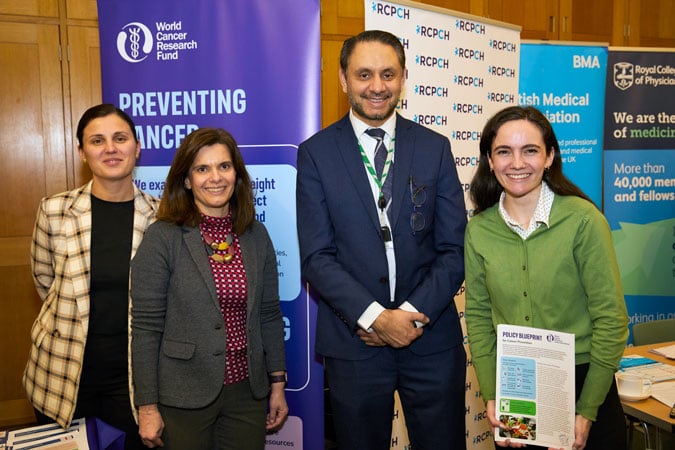
We participated in our first Obesity Health Alliance parliamentary event, meeting with the Minister for Prevention and 11 other Members of Parliament (MPs) to share our expertise in international nutrition policy.
We highlighted the link between obesity and cancer and the need for an integrated policy approach, as set out in our Policy Blueprint for Cancer Prevention.
We also shared best practice examples from other countries that the UK can learn from – critically demonstrating to MPs that it is possible for the UK to take meaningful action on obesity.
March: Welcoming new Policy Advisory Group members
Our Policy Advisory Group brings together leading policy experts from government, academia, and civil society around the world to guide WCRF’s efforts to turn evidence into action.
In March we officially welcomed four new members to the group: Dr Henry Li (UK), Dr Terry Slevin (Australia), Pubudu Sumanasekara (Sri Lanka), and Dr Si Thu Win Tin (Fiji) – expanding the group’s expertise to include more of our policy priority areas and increasing regional representation.
April: Making prevention central to England’s National Cancer Plan
Following the UK government’s World Cancer Day announcement of a new National Cancer Plan for England, we responded to the call for evidence with a clear message: prevention must be central.
Global reviews show most National Cancer Control Plans overlook prevention, and England must not repeat this mistake. Our submission therefore called for strong primary and tertiary prevention measures and bold action on modifiable risk factors such as alcohol and obesity.
Prevention remains the most sustainable and cost-effective way to reduce the growing cancer burden. We expect the National Cancer Plan for England to be published in early 2026.
May: Influencing global health for cancer prevention
In May, we attended the UN’s Multi-stakeholder Hearing in New York ahead of the 4th High-Level Meeting (HLM) on NCDs and mental health. We delivered a clear statement urging governments to prioritise cancer prevention through evidence-based, cost-effective policies.
We also launched our advocacy push around our HLM policy brief – calling for bold action on prevention, equity, and protection from industry interference – while meeting with key negotiating blocs.
We highlighted that around 40% of cancers are preventable by addressing modifiable risk factors. This engagement was a key moment in building momentum ahead of the Political Declaration negotiations later in the year.
June: Sparking a national conversation on alcohol and cancer
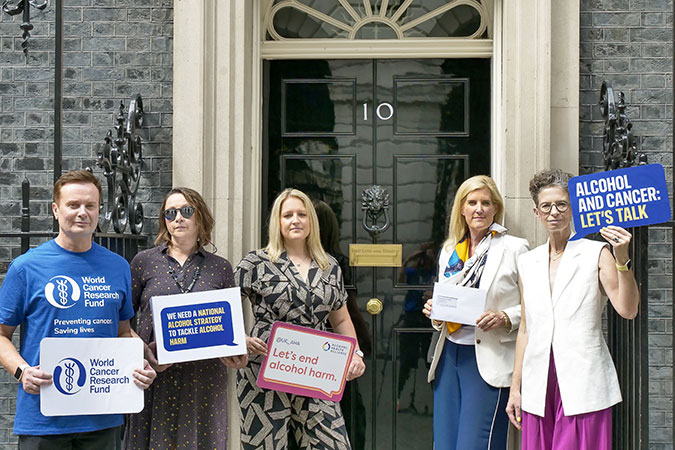
June was a highlight of our year as we marked Cancer Prevention Action Week (CPAW) in the UK, this time focusing on the little-known link between alcohol and cancer. Our bold campaign sparked a national conversation on alcohol consumption and raised awareness of the fact that it increases the risk of 7 cancers.
Working alongside more than 20 organisations and experts, we urged the government to implement a National Alcohol Strategy for England including evidenced-based policies such as minimum unit pricing, marketing restrictions and labelling.
We are thrilled that the government heeded one of our calls, with a commitment to introduce mandatory labelling.
July: Creating UK Parliamentary history
We also supported the first-ever UK Parliamentary debate on alcohol and cancer, which marked a historic moment in raising awareness of this long-overlooked cause of preventable cancer.
Led by Cat Smith MP, the cross-party discussion called for a comprehensive National Alcohol Strategy aligned with WHO ‘Best Buys’. Although the government ruled out a strategy, it did commit to mandatory alcohol labelling with health warnings and nutritional information – a welcome but partial step.
We’ve kept the pressure on alcohol policy since, with work on alcohol licensing, drink driving limits and the forthcoming consultation on labelling.
August: Presenting at the International Congress on Nutrition
We showcased our science and policy expertise on nutrition, cancer prevention and survivorship at the International Congress of Nutrition (ICN) at the end of August in Paris.
This included co-hosting a scientific symposium with Fédération Française de Nutrition (FFN) on our CUP Global Dietary and Lifestyle patterns report, as well as e-posters on our Policy Blueprint for Cancer Prevention and Policy recommendations to reduce the health impacts of alcohol.
September: Global Spotlight – UN High-Level Meeting on NCDs and Mental Health
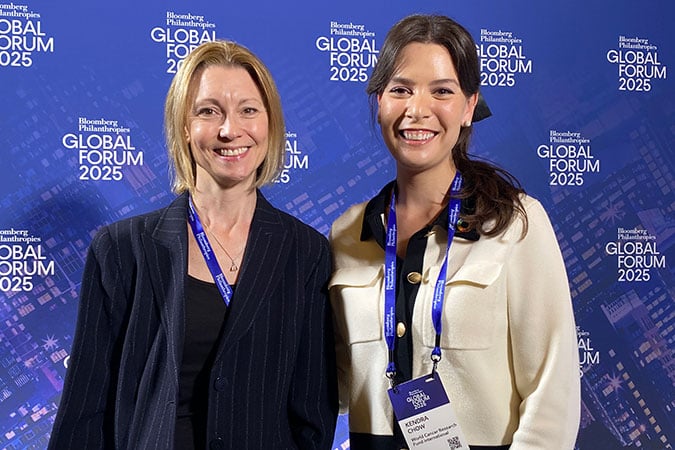
After an intense year of global health activity, the 4th UN High-Level Meeting on NCDs and mental health took place on 25 September in New York. The week was packed with NCD-focused side events and bilateral meetings, where we advocated for stronger, bolder global action on NCDs.
Although the final Political Declaration fell short on ambition for prevention, it included important recognition of cancer and the vital role of quality research. Many heads of state and ministers expressed strong national commitments to tackling NCDs and mental health and emphasised the need for urgent, bold action.
October: The 5th European Code Against Cancer
In October, the 5th edition of the European Code Against Cancer was launched, summarising the most up-to-date knowledge of the preventable causes of cancer.
It includes a set of 14 recommendations to help prevent cancer for individuals, including tobacco smoking, overweight and obesity, unhealthy diet, and lack of physical activity.
We are very proud that our research on these risk factors helped shape these 14 evidence-based recommendations.
November: Connecting with global cancer leaders
We attended the World Cancer Leaders’ Summit, strengthening global partnerships and exploring new collaboration opportunities – including with Australian research leaders and partners from Hong Kong ahead of next year’s World Cancer Congress.
We also met with IARC as they prepare for their 60th anniversary and aligned with the Union for International Cancer Control on promoting the new World Cancer Declaration.
We ended the week in Melbourne visiting Cancer Council Victoria, meeting our grant holders and PhD students – an inspiring reminder of the global partnerships that power our mission to prevent cancer worldwide.
December: Making mandatory alcohol labelling a reality
After securing a major public health victory with the UK government’s commitment to introduce mandatory alcohol labels featuring health warnings and nutritional information, the team is now consulting international partners in countries where similar measures have been considered such as Ireland, South Korea and Norway, to inform our position.
The evidence is clear: cancer warnings are particularly effective in changing consumption behaviours and can help address low awareness of alcohol’s link to cancer. Throughout 2026 and beyond, we will be working to ensure that labels are protected from industry influence and implemented at pace – this is a public health imperative.
Coming up in 2026:
- Review of NOURISHING and MOVING frameworks and databases
- Expanded policy work on breastfeeding, infant nutrition and cancer
- Greater policy focus on cancer survival and adherence to our Cancer Prevention Recommendations
- Providing policy perspectives to new CUP Global reviews and recommendations – including Ultra-processed foods
- Presence at the World Cancer Congress 2026
Read our previous annual round-ups

Get the latest Policy updates
Receive the latest on our databases, publications and how we’re getting involved in cancer prevention policy around the world
Ahead of the Budget, the Chancellor said it would deliver on the priorities of the British people to cut waiting lists, national debt and the cost of living.
In response to the Autumn Budget 2025, Kate Oldrige Turner, Head of Policy and Public Affairs at World Cancer Research Fund said:
“Almost half of cancer cases are preventable by addressing key risk factors such as obesity and alcohol, so we are pleased to see the UK Government take concrete steps on prevention in this Autumn Budget.
“The expansion of the UK’s world-leading levy on sugar-sweetened beverages to include milk-based drinks and plant-milk alternatives, alongside lowering the sugar threshold to 4.5g per 100ml, are particularly welcome measures. This will build on the immense success of the levy, which has reduced the average sugar content of drinks sold in the UK by almost half since it was introduced. Crucially, it will drive further reformulation and ensure that more drinks sold to consumers are healthier.
“We are also relieved that the Chancellor will raise alcohol duty in line with inflation. The World Health Organization has identified alcohol duty as one of the most effective ways to tackle alcohol-related harm, including alcohol-related cancers, so we are glad to see the UK Government take this forward.
As a research funder, we would have liked to see the important contribution of the life sciences sector acknowledged in the Chancellor’s speech. Continued support and investment in research are essential to advance our understanding of cancer prevention and survivorship.
To improve public health and reduce burden on the NHS, today’s measures must be the beginning – not the end – of a bold approach to prevention. With the National Cancer Plan for England expected early next year, the UK has a crucial opportunity to put prevention at the heart of its cancer strategy.
We look forward to working with the UK government to make prevention a reality – helping millions of people live free from the devastating effects of cancer.
The World Cancer Research Fund International Policy Advisory Group (PAG) brings together leading policy experts from government, academia, and civil society around the world to guide WCRF’s efforts to turn evidence into action.
Established in 2015, the group advises on how to identify and communicate evidence effectively to policymakers and advance cancer prevention efforts. Its role is to highlight critical needs, overcome barriers to implementation, and strengthen alliances that can drive wider uptake of effective cancer prevention policies.
In this blog, we put a set of pressing global public health questions to the group, inviting them to share their insights on how best to steer policy and action in cancer prevention worldwide.
Elevating NCDs on the global agenda
NCDs have historically received less attention than infectious diseases, but PAG members agree that this is beginning to shift – albeit slowly. Dr Feisul Mustapha (Ministry of Health, Malaysia) notes that ageing populations, fiscal pressure, and post-COVID backlogs make NCDs unavoidable.
However, as Dr Si Thu Win Tin (Pacific Community, Fiji) observes, recognition has not translated into concrete action and funding investment to address NCDs, particularly in vulnerable regions such as Pacific small island developing states (SIDS).
Dr Henry Li (Tony Blair Institute for Global Change, UK) reframes the argument: NCDs are not a crisis but a structural economic challenge, threatening productivity, social stability, and fiscal sustainability.
All members agree that NCDs must be positioned beyond the health sector. Dr Feisul emphasises embedding NCDs into universal health coverage (UHC), climate policy, and development financing. Dr Win Tin calls for integration into health security and resilience agendas to unlock funding, while Dr Li highlights the need for life-course approaches to manage long-term costs.
Financing must pivot toward prevention, using measures such as earmarked taxes on tobacco, alcohol, and sugary drinks, subsidy reform, pooled procurement, and domestic co-financing, matched with catalytic international support.
Political will and sustainable delivery models are critical: prevention must be framed as essential to economic and social stability, not optional.
Policy interventions for maximum impact
When asked which interventions should be prioritised, the PAG highlighted both structural durability and innovation. Professor Shiriki Kumanyika (University of Pennsylvania, USA) reframes the question by considering what has shown least impact: behavioural interventions alone have a limited population-level effect in the absence of structural solutions.
Additionally, new pharmaceutical treatments like GLP-1s are changing policy expectations. Evidence is now needed on how these therapies can support primary and secondary cancer prevention while reinforcing dietary and nutrition policy measures.
Dr Li highlights structural policies – sugary drink taxes, marketing restrictions, and urban planning—not for maximum efficacy, but because they are politically durable and difficult to reverse. He also suggests pairing prevention with early detection technologies as a “Trojan horse” to attract investment and political momentum, ultimately benefiting longer-term preventive strategies. Collectively, these insights emphasise balancing innovation, feasibility, and sustainability in prevention policy.
The case for prevention
Prevention remains the most neglected pillar of cancer control, yet it is essential for sustainability. Dr Pubudu Sumanasekara (Movendi International, Sri Lanka) points out that prevention reduces demand on treatment services, empowers communities, and embeds healthier norms into daily life.
Michelle Halligan (Canadian Partnership Against Cancer, Canada) provides evidence from Canada: prevention is central to the national strategy because it reduces incidence and healthcare costs. Tobacco alone costs $16.2 billion annually, including $6.5 billion in direct healthcare costs. Prevention strategies – from supporting smoking cessation to promoting healthier lifestyles—save lives, reduce inequities, and protect public finances.
Dr Li adds a political lens: prevention is often unrewarding in the short term. Politicians prefer visible treatment projects, while prevention yields long-term gains. He recommends creating early wins, building unusual coalitions with employers, insurers, and urban planners, framing prevention as an economic opportunity, and leveraging health system crises to demonstrate that prevention is the only sustainable solution. Prevention must be reframed as an essential, politically relevant pillar of cancer control.
Equity in policy
Ensuring policies reach underserved populations is critical. Dr Feisul emphasises building equity into design from the outset: remove user fees, use disaggregated data, co-create with communities, and finance outreach.
In low- and middle-income countries, delivery models such as community health workers, mobile clinics, workplace hubs, HPV self-sampling, single-visit screen-and-treat programs, and patient support for travel and childcare are essential. Continuous monitoring and course-correcting ensure equitable coverage.
Halligan advocates proportionate universalism: combining universal access with targeted approaches ensures equity-denied populations are served while maintaining broad reach. Building trust and co-developing culturally safe services is essential. Professor Kumanyika suggests clarifying definitions of equity to guide concrete policy actions.
Dr Li cautions that rigid equity-first approaches can slow progress. Instead, he recommends designing universal programmes that can scale, then addressing gaps through adaptive, iterative policy interventions. Equity emerges most effectively from sustainable, abundant delivery systems rather than as a precondition that restricts innovation.
Partnerships for scale
Partnerships are vital to scaling cancer prevention. Dr Feisul identifies four priority collaborations:
- governments with civil society for accountability and last-mile delivery
- academia for research and implementation evaluation
- private sector actors for regulated co-delivery via logistics, workplaces, and digital tools
- and multilateral agencies and philanthropy for catalytic funding.
Dr Sumanasekara emphasises government coordination to align stakeholders, including media and private sector actors. Michelle Halligan highlights trust-based, reciprocal partnerships with communities historically excluded from decision-making (such as Indigenous peoples in Canada).
In the Pacific region, Dr Win Tin stresses the importance of regional organisations, communities, faith-based groups, and private-sector engagement. Professor Kumanyika adds that partnerships should link cancer prevention with human rights and environmental sustainability.
Dr Li warns that many partnerships fail because organisations optimise for their own visibility rather than shared outcomes. Successful partnerships create new delivery entities with shared risk, governance, and accountability, focusing on population-level outcomes. Examples include joint ventures between governments, tech companies, and payers, or employer–healthcare provider collaborations responsible for long-term employee health. Effective partnerships are about delivery, not coordination.
Under-recognised priorities
Several priorities remain under-recognised globally. Dr Sumanasekara identifies alcohol as a major neglected cancer risk factor: its social and economic costs are poorly researched, public awareness is low, and industry interference slows policy progress. Harm to others beyond individual users is especially overlooked, highlighting the need for communication strategies that change behaviour.
Dr Li points to systemic gaps: insufficient workforce for prevention, lack of implementation science, and inadequate interoperable data systems to coordinate care and target high-risk populations. Dr Win Tin notes that political and commercial pressures frequently block well-evidenced fiscal and regulatory interventions.
Dr Li emphasises that the disconnect is political rather than scientific: research must focus not only on what works, but on how to implement interventions successfully within complex political and institutional environments.
Underserved populations
PAG members highlight populations most overlooked in research. Dr Win Tin points to small island populations, indigenous communities, and remote rural areas, whose cultural, environmental, and dietary contexts are rarely studied, leaving policy misaligned with local realities.
Dr Li adds middle-income countries experiencing rapid urbanisation, where high-risk populations outpace health system capacity. He also notes populations outside traditional health system reach, including specific employment or demographic groups. Dr Li stresses that the central challenge is not evidence generation – World Cancer Research Fund and others already provide robust data – but translating it into politically sustainable and implementable policies that reach the populations who need them most.
Conclusion
Across these discussions, several consistent themes emerge.
- NCDs and cancer prevention are economic, social, and development imperatives, not optional health priorities.
- Prevention must be central, politically framed, and paired with structural interventions that endure. Equity should be embedded into delivery systems but approached pragmatically to avoid stifling innovation.
- Partnerships must move beyond coordination to create delivery-focused entities with shared accountability.
- Under-recognised risks such as alcohol, underserved populations, and implementation challenges demand greater attention.
- Finally, closing the gap between evidence and policy requires understanding political economy, incentivising prevention, and designing sustainable systems capable of delivering at scale.
Collectively, the PAG’s insights provide a roadmap for elevating cancer prevention and NCD policies globally: combine robust evidence with political strategy, innovate delivery, embed equity, and scale impact through partnerships aligned around outcomes rather than institutional interests.
With the UK Labour Party in government for just over a year, this year’s Party conference provided a valuable opportunity to take stock of the progress made on health and identify areas in need of improvement.
Academics, people with lived experience, and experts from thinktanks and charities congregated in Liverpool in September to share how the government can be bolder on prevention – here are my top five takeaways:
1) Tackle poverty alongside prevention
Just before conference, the government published its 10 Year Health Plan for England, setting out a raft of policy priorities to achieve its health mission. Positively, a key theme throughout the Plan was the need to tackle health inequalities – the systematic and unfair differences in health between different groups of people – especially through prevention.
At an IPPR and Impact on Urban Health fringe event, “Can the Government deliver its long-term health mission?”, speakers made impassioned pleas about the need to address the social determinants of health. Dr Sonia Adesara, a practising GP and Vice Chair of the Fabian Society, explained that while she may be able to treat the symptoms and health issues that manifest as a result of living in poverty, such efforts are in vain if the government does not tackle the root causes of ill health.
These drivers are wide ranging, from poor food environments, where junk food is the cheapest and most available option, to substandard housing. Crucially, addressing them requires the adoption of a truly cross-governmental approach. As Peter Babudu, the Executive Director at Impact on Urban Health, put it, even the Department for Health and Social Care at its very best cannot tackle these complex issues alone.
These are subjects World Cancer Research Fund has engaged with significantly through our blog series on health inequality and cancer.
2) Prioritise public health over industry interests
Another hot topic at conference was the need to place public health above vested interest. The history of industry derailing, delaying and diluting public health policy in pursuit of profit has long been documented both in the UK and abroad. Yet, the food and drink industry continues to play a key role in various policy development processes under Labour.
The delayed junk food marketing ban provides a clear example of why the government needs to make a concerted effort to tackle vested interests. October was meant to see the implementation of a key manifesto pledge: a watershed ban on junk food advertisements. Instead, the ban, which could have a profound effect on reducing childhood obesity, has been delayed yet again. Worse, industry lobbying has resulted in a complete brand exemption. In practice, this means that products like Cadbury Diary Milk, Mars bars, and Coca-Cola can still be advertised because they are not only products but brands as well.
Walking through the exhibition hall, the presence of industry was hard to miss, with prominent stands for Heineken and Sainsbury’s – a reminder that just like those of us in public health, industry is also working hard to influence government.
3) Bring the public along on prevention
Action to improve public health is often depicted, especially in the media, as “nanny-statism”. At Nesta’s event, “How can the government make its health reforms a success?”, Kevin McKenna, the MP for Sittingbourne and Sheppey and a former NHS strategist, insisted that we need to communicate more clearly with the public about why the 3 health shifts (sickness to prevention, analogue to digital, and hospital to community) are so important. Ultimately, we need a more compelling case to counter the “nanny-state” narrative, which does not reflect the public’s views. Polling consistently shows strong support for government action to improve health and reduce inequalities.
Meanwhile, at Demos’ fringe “Prevention: From overlooked to mission critical”, Prof Gurch Randhawa, Director of the Institute for Health Research, emphasised the importance of approaching prevention in a culturally sensitive manner so that everyone benefits. For example, schemes providing healthy food to those in need must take into consideration the food preferences and dietary requirements of the diverse communities they serve.
The task of bringing the public along on the prevention agenda does not rely solely on the government – charities, including ourselves, can play an important role. Our brilliant Health Information team’s work educating the public on how they can reduce their risk of developing cancer through good nutrition and an active lifestyle is just one example.
4) Beware the temptation of silver bullets
Despite the recognition of the need for a health-in-all-policies approach, the temptation of “silver bullets” and quick fixes loomed. This was particularly notable in discussions around weight-loss jabs.
In the UK, obesity is the second biggest cause of cancer after smoking. Addressing this crisis requires a coordinated approach that includes both prevention and equitable access to treatment. However, in his conference speech, the Health Secretary, Wes Streeting, didn’t quite echo these sentiments. Instead, he declared that “weight-loss jabs could help us finally defeat obesity”, while failing to mention the need to fix our broken food environment.
The hype around weight-loss drugs was reflected in long queues for a New Statesman event hosted in partnership with Eli Lily, a pharmaceutical company that produces appetite suppressants.
Wearable tech also came up in a similar context, with suggestions that it could revolutionise how individuals take charge of their own health. It was positive that the need for digital inclusion was recognised, but again, we need to ensure that proven policy interventions, such as salt and sugar taxes, remain the first port of call.
5) Reducing alcohol harm is key
One glaring omission was the absence of discussion on alcohol harm, especially given that alcohol deaths have reached record highs across the UK.
Charities including the Forward Trust ensured the issue was still on the agenda, hosting a sober reception as part of their work to advocate for alcohol-free spaces at conference.
We also highlighted alcohol harm, building on this summer’s Cancer Prevention Action Week, which sparked a national discussion on the link between alcohol and cancer. This included meeting with Dr Scott Arthur MP at conference to discuss alcohol-related cancer and the urgent need for government to deliver on its commitment to introduce mandatory alcohol labelling, ensuring that labels make the cancer risk of alcohol explicit.
The prevention mission is here to stay
Despite the long way we have to go, one thing is abundantly clear: the prevention mission is here to stay.
Fortunately, there are several critical influencing opportunities on the horizon where the government can apply these lessons from conference, such as the forthcoming National Food Strategy. Over the coming months, we’ll be working hard to hold the government to account in delivering on cancer prevention and survivorship.
If you’d like to keep up to date with our work, sign up to our monthly Policy and Public Affairs newsletter. If you have any thoughts on what we’ve covered in this blog, we’d love to hear from you! Get in touch with us at policy@wcrf.org.
Setting the Global Direction
The Road to the 4th High-Level Meeting (HLM4) on the Prevention and Control of Non-communicable Diseases (NCDs) and the Promotion of Mental Health has been a long one.
Kendra Chow (Senior Policy & Public Affairs Manager) and Dr Helen Croker (Assistant Director of Science and Policy) were in New York – alongside government officials and policymakers from around the world, civil society and lived-experience advocates – joined in a busy week of side events and bilateral meetings leading up to the HLM4 at UN Headquarters on 25 September in New York.
Amid a bustling and busy New York scene, the week’s events offered a rare opportunity for governments to set the global course to address NCDs and (for the first time) mental health.
The Political Declaration – a document that has been negotiated by Member States from May through September – was set to be adopted that day. The Declaration is a critical tool that will shape global health priorities until 2030 – a crucial window for progress on cancer and other NCDs.
And although, in the end, it was not officially adopted on the day of the HLM4 (due to concerns raised by a small number of Member States), the number of Member States that did voice their support for the Declaration’s contents and commitments indicates that it is likely to approved in the General Assembly after a voting process.
We have been actively engaged along the entire road to the HLM4 – participating in the multistakeholder hearing in May, meeting with Member State Missions in New York and Geneva, and emphasizing that prevention is the most effective and equitable way to reduce cancer and NCD burden (read our High-level Meeting advocacy brief).
Cancer gains, but gaps remain
There is welcome recognition in the Declaration that cancer is a global priority, with an emphasis on research, evidence and innovation. This is a win for us because we repeatedly pressed Member States for the urgency of cancer to be included in the final Declaration, and these gains in visibility matter.
One in 7 deaths worldwide is caused by cancer. The Declaration includes specific commitments on reducing cases of cervical, childhood and liver cancer, which is meaningful progress.
The need for prevention
The Declaration also includes an ambitious target: by 2030, at least 80% of countries should have operational, multisectoral NCD and mental health strategies in place. This milestone matters, and WCRF International welcomes it as a step forward. But for these strategies to truly succeed, they must be rooted in prevention. Without embedding prevention, policies risk becoming too heavily focused on treatment-focused, missing the opportunity to save lives and reduce costs through avoiding disease in the first place.
Evidence shows that 40% of cancers are preventable by acting on key risk factors—unhealthy diets, alcohol, tobacco, obesity, and air pollution. The Declaration acknowledges these risks but stops short of committing to strong preventive measures.
Alcohol is one clear example: the text refers only to “harmful use”, but we know there is no safe level of consumption. Stronger, clearer language is needed if prevention is to drive meaningful change.
The case for health taxes
Health taxes are a proven part of the solution. The evidence is clear: fiscal measures on tobacco, alcohol and sugar-sweetened beverages are among the most effective public health tools available. They deliver health gains, generate economic returns, and are among the WHO best buys (and WHO EURO’s “quick buys”).
Despite this overwhelming evidence, the Declaration fails to deliver firm commitments on health taxes, reflecting the political sensitivity of fiscal measures. WCRF International believes finance ministries, alongside other sectors, must show leadership by adopting prevention-focused fiscal policy.
Tackling political and commercial pressures
The cautious language in the Declaration also reflects our current global political climate. Evidence-based measures such as health taxes and alcohol regulation faced strong pushback during negotiations, amplified by lobbying from unhealthy commodity industries that distort science and confuse the public.
This weakens trust in health policy and emboldens opposition, making it harder for governments to commit to bold action.
Conflicts of interest remain another challenge. Industries that encourage people to buy and use unhealthy products should not shape health policy.
Without institutional safeguards, prevention risks being sidelined in favour of commercial. We continue to call for clear protections to ensure that public health, not profit, drives decision-making.

Dr Helen Croker and Kendra Chow at the UN HLM High Level Meeting in New York
Civil Society’s role
Civil society participation is another area where commitments could have been stronger. People living with NCDs and the organisations that represent them should be central to governance and accountability. Yet compared with previous Political Declarations, this text weakens those commitments. For implementation to succeed, participation must be meaningful, resourced, and embedded in national coordination mechanisms.
Building from here
The NCD burden is urgent and rising, but the solutions are within reach. Prevention is non-negotiable. Health taxes, alcohol control acknowledging no safe level of consumption, and healthier food environments must sit at the centre of national responses. Tackling misinformation, industry interference, and weak implementation is just as important as designing strong policy.
Taken together, these dynamics highlight why the Declaration must be seen as a floor, not a ceiling. Emphasis on the cancer burden and the target for national plans provide a platform to build upon, but prevention must be prioritised if we are to make real progress.
Governments will need political courage, strong leadership, and cross-sector collaboration to deliver on their promises.
We will continue to advocate for prevention as the most effective and equitable approach to reducing cancer and NCDs, and are ready to work with UN agencies, Member States, and partners such as the NCD Alliance and UICC to translate the Declaration’s commitments into national action.
> Read our statement prepared for the UN High-level Meeting on NCDs and mental health
Promoting, protecting and supporting breastfeeding should be a key goal of public health in the 21st century. Yet many women struggle to breastfeed or opt not to, often in the absence of adequate support across policy, societal, and healthcare systems.
This blog sets out why policies to support as many parents as possible to choose breastfeeding are more needed than ever.
Less than half of babies breastfed worldwide
Once common, lower breastfeeding rates are associated with the advent of pasteurised and commercial infant formula milk. However, as modern science advanced, we now understand much more about the benefits of breastfeeding.
While infant formula may adequately meet the nutritional needs of babies, and should be available and affordable when needed, breastfeeding offers multifaceted benefits for both mothers and babies that cannot be acquired via breastmilk substitutes.
These benefits for babies include:
- protection from infection
- better dental health
- better digestion
- learning important feeding responses such as knowing when they are full.
These benefits are not temporary; they help mothers and babies over their life. Our research shows that breastfeeding protects mothers against breast cancer, and protects children against excess weight gain, and living with overweight and obesity.
Yet, globally, fewer than half of all babies under 6 months old are exclusively breastfed, as recommended by the World Health Organization. Current and future generations will, thus, miss out on these important benefits and increase their vulnerability to ill-health in their futures.
Supporting women to breastfeed
Nonetheless, breastfeeding comes with challenges for many parents. We’ve set out what governments should prioritise in our policy factsheet on breastfeeding and cancer risk. This outlines the importance of offering support in healthcare settings, alongside fiscal and legal policies such as appropriate parental leave, and stricter marketing regulations on infant formula and other follow-on milks marketed for babies and young children.
We know that supportive environments are key in ensuring that appropriate and well-designed support for breastfeeding is offered in healthcare and community settings. This means counselling on feeding is offered as part of antenatal care, as well as when a baby is born, to support continued and exclusive breastfeeding up to 6 months and beyond.
In many settings, these services may be understaffed or not prioritised. Yet they are key to helping parents and mothers feel supported, rather than left to manage a complex process by themselves.
Legal policies are also important, and include:
- parental leave,
- enabling women to breastfeed at work and study, or
- protecting breastfeeding in public areas.
They can create an environment where the needs of mothers and babies are prioritised and normalised. For example, the UK does not offer maternity, paternity or shared parental leave that meets the national minimum wage. Undoubtedly, this creates an environment where parents must prioritise their return to work over their feeding choices.
Breastfeeding is also influenced by commercial factors. Governments should do more to ensure that the marketing of infant formula does not affect the feeding choices people make. Studies in the UK have shown that parents will often choose more expensive formula for infants in a false belief that they are investing in their child’s future, even when the products are nutritionally equivalent.
This shows there is a strong argument that price controls or own brand formulas are warranted given that all products are tightly regulated and comparable in nutritional value.
New products are also emerging at a fast rate, such as milks for babies older than 6 months old. These products are unnecessary, often very high in sugar, and aggressively marketed. Many of these formulas include inappropriate claims on packaging, such as statements about promoting babies’ growth. These are not appropriate and are infringing on international standards set in the International Code of Marketing of Breastmilk Substitutes.
Smart investment by governments
Investment in policies to support breastfeeding are not a cost, but rather key investments in the health of future generations and likely lead to cost savings across health systems by avoiding ill-health.
Breastfeeding also has environmental benefits, with the environmental costs of producing, packaging and exporting formula considerable. This cost is set to grow as the infant feeding market is booming, with milks for toddlers as well other commercial baby foods such as food pouches increasingly targeted for commercialisation. The associated profits and importance for local economies hides costs such as environmental degradation, as well as health harms.
Individuals, societies and governments need to recognise the proven benefits of breastfeeding. Policies cannot fall behind what is important for the health, wellbeing and wealth of future generations and must protect parents from inappropriate marketing practices so they can make informed choices about feeding their baby, aided by the necessary support.
World Breastfeeding Week is celebrated every year in the first week of August, championed by WHO, UNICEF, Ministries of Health and civil society around the globe. It’s a time to recognise breastfeeding as a powerful foundation for lifelong health, development, and equity.
Explore more on breastfeeding
The UK government published its 10-year Health Plan on 3 July, setting out its ambitions to reform the health system and shift the focus from sickness to prevention.
As a cancer prevention charity with a vision of a world where no one dies from a preventable cancer, we welcome the Plan’s direction but there are many key areas of health policy where it simply falls short of what the public needs.
Positive inclusions
Many of the commitments in the Plan had already been announced and were warmly received, such as the expansions of free school meals and the Soft Drinks Industry Levy.
Encouragingly, the Plan also includes new mandatory measures that mark a meaningful step towards creating healthier environments for all.
These include:
- Mandatory healthy food sales reporting for all large companies in the food sector.
- Mandatory healthy food standard to improve the healthiness of sales.
- Updates to the nutrient profile model, used to set marketing restrictions on junk food.
- 10% uplift to restore the value of the Healthy Start scheme from 2026–27.
- Mandatory labelling on alcoholic drinks to include consistent nutritional information and health warning messages.
- Place-based approach to physical activity, including £250m for 100 places via Sport England, at least £400m for local community sports facilities, and new school sport partnerships.
- National walking and running campaign led by Sir Brendan Foster.
- Development of a new physical activity strategy.
These measures are welcome steps forward in improving our food and drink environment and enabling people to be more physically active.
We hope the forthcoming National Food Strategy will drive deeper systemic changes to ensure affordable, accessible healthy food for everyone in England.
Critical missed opportunities
On alcohol, the Plan falls short of prioritising the range of evidence-based policies proven to reduce alcohol consumption, which causes around 17,000 UK cancer diagnoses each year.
Notably, it fails to include minimum unit pricing (MUP) for alcohol in England, despite the success of MUP in reducing alcohol-related deaths in Scotland and Wales. Worryingly, England continues to lag the devolved nations on this crucial policy.
The Plan also makes no mention of strengthening marketing restrictions on alcohol, and so enables industry to continue to normalise drinking as an aspirational lifestyle choice.
Given the rising number of alcohol-related deaths each year, we are urging the UK government to deliver a National Alcohol Strategy for England. As outlined in our recent letter to the Prime Minister, Keir Starmer, during Cancer Prevention Action Week, we continue to call for bold action on alcohol-related cancer.
Equally disappointing is the absence of action to strengthen protections and support for breastfeeding and infant feeding. There are no new mandatory, independently enforced regulations on the composition, marketing and labelling of baby and toddler foods. This is a missed opportunity, particularly in light of the UK government’s stated goal to raise the healthiest generation of children ever.
We will continue to urge the government to adopt the recommendations of the Competition and Markets Authority’s market study on infant and follow-on formula.
Turning ambitions into action
This Plan arrives as Labour marks its first year in government under Starmer. This government now has the opportunity – and responsibility – to turn its prevention agenda into lasting structural change that improves the nation’s health.
The upcoming National Cancer Plan for England presents a further chance to address modifiable risk factors and fill the gaps left by the 10-year Health Plan.
We welcome the Prime Minister’s willingness to challenge accusations of “nanny statism” and urge the government to ensure all health strategies are protected from undue industry influence.
We want prevention to be the foundation of all health strategies. We stand ready to bring our scientific and policy expertise to the table – and we’re calling on the UK government to work with us to turn bold ambition into real change, helping millions live longer, cancer-free lives.





